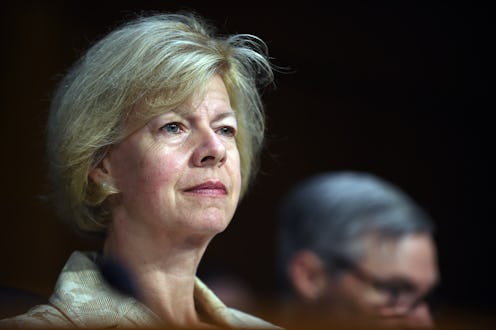News
Sen. Baldwin Put Words To LGBT Emotions On Orlando
For gay, lesbian, bisexual, and transgender Americans, the slaughter of 49 people in Orlando has been hard. Really hard. Personally, I've had a difficult time stomaching the news; I broke down in tears several times, bawling while watching Anderson Cooper read the names of the victims. On social media, friends tell the stories of their friends who were killed, about their former plans for the future, and how you can now donate to their funerals. It's intense stuff, and to understand what we're going through, start with Sen. Tammy Baldwin's comments at Wednesday's filibuster on gun control.
Sen. Chris Murphy of Connecticut has been filibustering — with the help of his colleagues — since Wednesday morning to force a vote on a few basic gun control measures. At about 6 p.m. ET, Baldwin asked her colleague a question, starting off with the fight for gun control and the lack of reaction after past massacres like Sandy Hook. But then the first openly lesbian elected senator gave voice to the special effect the Orlando attack has had on the LGBTQ community:
I also have to speak as a member of the LGBT community. On Friday, this last Friday, I had the honor of going to the opening ceremonies at Milwaukee, Wisconsin's PrideFest. They were celebrating their 30th year of PrideFest. In preparing for what I was going to say at that opening ceremony, I reflected on how different things were 30 years ago in 1986. That was actually the year I was first elected to local office. And I didn't have a lot of colleagues who were in the LGBT community in America, let alone the world at that point in time. And, boy, we have changed. We have seen such progress.
But after celebrating the opening of PrideFest in Milwaukee, I woke up on Sunday morning, as we all did, to this horrific, this horrific tragedy in Orlando. A hate crime is a crime that targets a particular audience, a particular group in order to send terror throughout that community, not just the victims but all who share characteristics with the victims, and in a month, June, which is Pride Month, to usually celebrate how far we have come over oppression, over discrimination, over hate crimes, to wake up and see this was truly unspeakable.
The progress we've made as a community in recent years is astounding. Even looking back just five years ago, the legal and cultural landscape today is unrecognizable for LGBTQ Americans. Yes, there's so much more to do, and violent attacks remain far too common, especially on transgender members of the community. But there was never anything like this. The closest comparable hate crime in scale happened in 1973, more than 40 years ago.
Baldwin gives voice to the feeling that we LGBTQ people have, the feeling that once again we are a target. A society that seemed to move closer and closer to acceptance and equality for its LGBTQ citizens also raised a man who hated us so much, perhaps hated himself so much, that he decided to gun us down. That realization comes as a shock. His actions shattered the feeling of safety and acceptance that arose from so many successive legislative and judicial victories.
But this shock must also galvanize us toward the next fight. How do we stop this from happening again? Baldwin, during her question, said she supports an amendment to the appropriations bill H.R. 2578 that would increase funding to investigate and prevent hate crimes. In addition, she said she will support an amendment from Sen. Bob Casey of Pennsylvania that would add misdemeanor hate crimes to the list of offenses that would prevent the purchase or possession of "weapons of war." And that's on top of universal background checks.
Because, as Baldwin said:
When is it enough? When are we going to act? We also in the political world so regrettably fall into our — I don't know what to call it — comfort zones. You know, let's only talk about this as a terrorist incident or let's only talk about this as a hate crime or let's only talk about this in terms of gun violence. This is all of the above, and we have to come together. We have to be united. We have to be strong in order to respond.
She went on to read the names of all the 49 victims and what we know about them. Then Baldwin ended her comments with a question: "Do you agree that the time to act is now and our thoughts and prayers for their deaths are important but not enough?"
Yes, we do, Sen. Baldwin.
